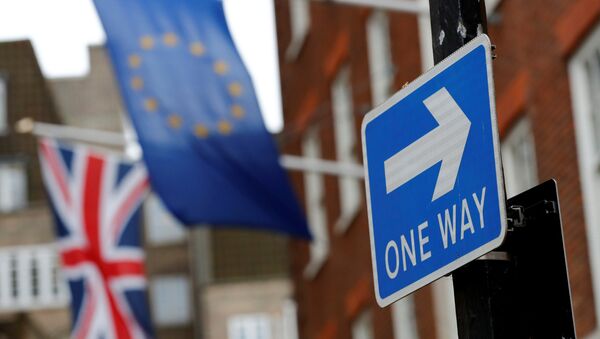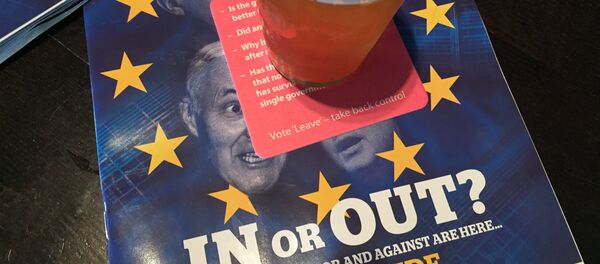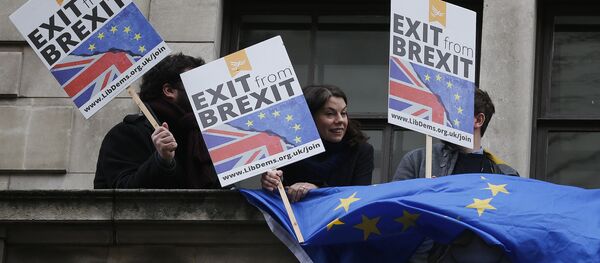Meanwhile, former British Foreign Secretary Boris Johnson has accused Theresa May of forcing through a deal to keep the country locked in the EU customs union in what he called a "total surrender."
Sputnik discussed the issue with Dr Kevin McNicholl, a research fellow at the University of Edinburgh.
Sputnik: In your opinion, why did Theresa May decide not to proceed with the emergency meeting on Monday?
Sputnik: How strong are the disagreements within Mrs. May's Cabinet?
Kevin McNicholl: It's quite interesting that the most vocal opposition would be between those ministers that have sympathy for the backbenchers who are absolutely insistent on no form of permanent customs alignment with the rest of the EU. This is one part of what would be required to maintain some sort of a frictionless border if, indeed, Northern Ireland was to remain in a similar arrangement.
READ MORE: Dangerous Oscillation as Brexit Deal Gets Banged Up & Time's Running Out
Of course, there's also this deal with the DUP, the Democratic Unionists; they would not prefer to stay in some sort of a customs alignment, but their primary focus is on maintaining the same regulations as the rest of the UK so that there's no kind of a wet border in the Irish Sea.
Sputnik: Former Brexit Minister Steve Baker stated the Brexiteer Tories would not support Theresa May's Brexit deal; why is that and how can this impact Mrs. May's position within her party?
I'm not sure they will vote against it, because once it actually comes to the vote, in the end, Theresa May would be presenting this as a vote between a deal that makes everyone slightly unhappy or no deal at all, which could potentially be catastrophic. I just don't know if it's a bit of a bluff from a pro-Brexit camp, whether they are really willing to vote for a no-deal or not. I think that whenever it comes to it, Theresa May may be very tempted.
READ MORE: UK PM Cancels Monday's Emergency Govt Meeting on Brexit Deal — Reports
If I was her, and mercifully I'm not, I would try and propose a deal that would get some sort of a UK-wide customs alignment for at least the foreseeable future so that would maintain the DUP support, perhaps the SNP, perhaps a huge proportion of the Labour Party; and if she was able to maintain the support the majority of the Conservative Party, she could walk away claiming some kind of a victory.
Sputnik: We've just got a report that the EU's chief Brexit negotiator warned ministers from the other 27 member states that no deal has been sealed on Britain's departure from the bloc; are we about to see a no-deal Brexit?
I can understand that the pro-Brexit backbenchers would try and ramp up the tension; but I'm not at all sure. Once it comes to the vote, I think that people will probably vote for a marginally unpalatable deal rather than one that does bring a no-deal situation.
Sputnik: In your opinion, should issues of vital importance be decided in public referendums or should people with expertise, that is politicians, address these issues? I ask you because in 2016, the people have spoken; they said "we want to leave the bloc"; and now, according to recent surveys and polls, these people say "you know what, we've changed our mind; we want to remain."
Kevin McNicholl: That's a great question, actually, because on one level the people have spoken; there was a lot of pro-Brexit sentiment for very many decades. It was something that had been increasing in popularity, especially with the rise of UKIP and the sort of a xenophobic anti-immigrant sentiment that had been on the rise for some time. It was hoped that this would at least release some pressure there, but, indeed, the entirety of the EU and the relationship between the UK and the EU is a very complex and a very technical one; it's not one that many people understand fully.
READ MORE: Britain's Armed Forces Making Plans for 'No Deal' Brexit — Defence Official
The views expressed in this article are solely those of Dr Kevin McNicholl and do not necessarily reflect the official position of Sputnik.






